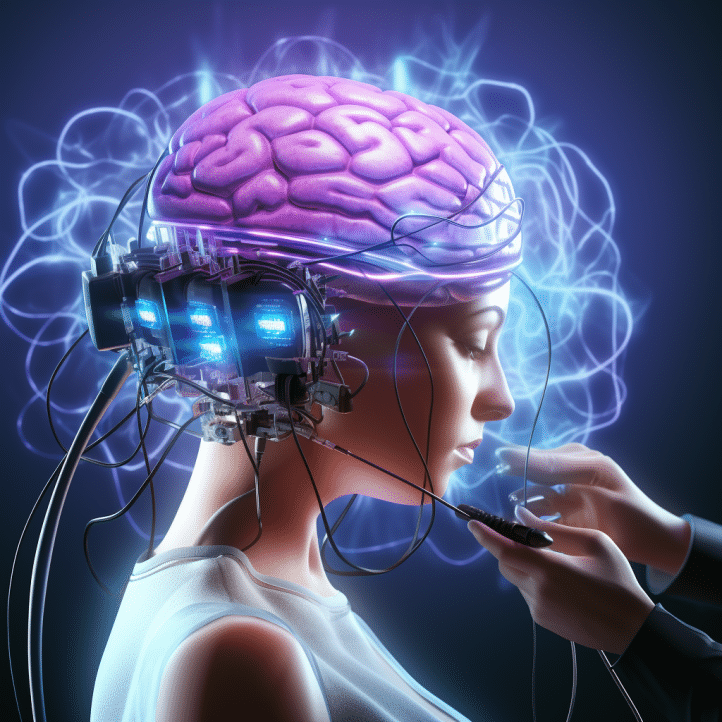Deep brain stimulation using focused ultrasound leads to rapid remission of severe depression in breakthrough patient case study.
Key Facts:
- Focused ultrasound targeted and suppressed hyperactive areas linked to depression.
- Stimulation lasted just 64 minutes yet caused depression remission for over 6 weeks.
- Approach is noninvasive and precisely targeted with no side effects observed.
- Technology could expand neuromodulation treatments to more patients.
Source: Journal of Medical Case Reports 2023
Focused Ultrasound to Treat Depression
A novel technology that non-invasively stimulates the brain using focused ultrasound beams has shown remarkable potential as a depression treatment in a recent patient case report.
Researchers were able to precisely target and suppress specific overactive brain regions linked to severe depression.
Just a single 64-minute session of deep brain stimulation caused the patient’s severe treatment-resistant depression to go into full remission.
What’s more, the remission persisted for over 6 weeks with no side effects observed.
The breakthrough showcases the promise of focused ultrasound to selectively “reset” malfunctioning mood circuits, potentially transforming depression care.
The noninvasive approach could enable neurmodulation therapies to be applied to far more patients compared to existing implanted device options limited by risks and costs.
Case Report: 30-Year-Old Woman with Treatment-Resistant Depression
The patient was a 30-year old woman with a 13-year history of severe depression unresponsive to medications, psychotherapy and electroconvulsive therapy (ECT).
Her symptoms were linked to hyperactivity in the subcallosal cingulate, a deep brain structure that forms part of the limbic system involved in emotional processing.
Excessive activity in this area inhibits positive mood.
The researchers used a specially designed ultrasound device called Diadem to target and suppress the overactive subcallosal cingulate area.
The technology works by using intersecting beams to precisely focus ultrasound waves deep within the brain without invasive surgery.
Diadem contains two arrays of ultrasound transducers positioned on opposite sides of the head.
The researchers use magnetic resonance imaging (MRI) to visualize the patient’s brain anatomy and guide the acoustical focusing.
Low-Intensity Ultrasound Pulses at Targeted Brain Regions
The stimulation involved a series of brief, low-intensity ultrasound pulses targeted at three locations linked to the subcallosal cingulate.
The 30 millisecond pulses were delivered every 4 seconds for an average of 2 minutes per brain site.
The researchers modulated a total of three areas for 64 minutes of active stimulation.
The peak acoustic intensity was kept under FDA safety limits for diagnostic ultrasound to avoid tissue damage.
MR thermal imaging also confirmed no heating occurred.
Rapid Recovery From Depression
Remarkably, the patient’s severe depressive symptoms dissipated within 24 hours of the single stimulation session.
Her depression score fell from 11 down to 0, indicating remission.
The positive effects remained for over 6 weeks with no recurrence.
The patient reported feeling like herself again for the first time in years.
The researchers suggest the ultrasound acts to “reset” the abnormal limbic system activity by activating glial cells that regulate synaptic function.
However, more research is needed to fully understand the mechanisms.
Noninvasive Alternative to Brain Implants
The findings showcase focused ultrasound as a powerful new tool to selectively modulate malfunctioning brain circuits with precision and safety.
The approach could provide a badly needed alternative to invasive deep brain stimulation techniques used for depression and other neurological conditions like Parkinson’s disease.
Current implanted devices carry risks from brain surgery, infections, and hemorrhages. The electrodes can also shift over time.
Focused ultrasound stimulation is noninvasive and circumvents these limitations.
The electronic steering enables precise targeting with no implants or incisions.
The modulation can be adjusted in response to symptoms by simply re-planning the acoustical focusing.
This contrasts with implants where the electrodes remain fixed after surgery.
Expanding Neuromodulation Potential in Depression
Given the advantages, noninvasive focused ultrasound could vastly expand the number of patients able to benefit from neuromodulation therapies.
Over 320 million people worldwide suffer from depression.
Treatment resistance affects up to 30% of these cases.
Many do not respond to medications, psychotherapy or even electroconvulsive therapy.
Deep brain stimulation has shown promise for such hard-to-treat depression.
But the risks and costs of brain surgery preclude many patients.
Focused ultrasound offers similar neuromodulation effects without surgery.
The system is compatible with standard MRI scanners available at many hospitals and clinics.
If clinical studies support the initial findings, noninvasive focused ultrasound could be adopted widely to help patients unresponsive to other depression treatments finally achieve remission.
Beyond depression, focused ultrasound shows promise to address pain, obsessive compulsive disorder, addiction, epilepsy, Parkinson’s and many other neurological conditions through targeted neurostimulation.
Preliminary Evidence to Support Focused Ultrasound in Depression
While promising, it is important to note this research represents only an initial patient case study.
Much more clinical investigation is needed to demonstrate safety and efficacy.
The depression relief could have been coincidental and randomized controlled trials are essential to prove clinical utility.
Identifying biomarkers and dosing regimens to optimize treatment effects will also be key.
There remain technical hurdles to translate the laboratory research into widespread clinical adoption.
The custom ultrasound helmet must be made less bulky while still steering the waves accurately.
If the technology’s potential is proven with robust clinical studies, focused ultrasound could lead to a new era of personalized noninvasive neuromodulation free of implants, transforming how medicine treats depression and other psychiatric conditions.
References
- Paper: Durable effects of deep brain ultrasonic neuromodulation on major depression: a case report (2023)
- Authors: Thomas S. Riis et al.

